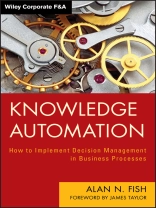A proven decision management methodology for increased profits
and lowered risks
Knowledge Automation: How to Implement Decision Management in
Business Processes describes a simple but comprehensive
methodology for decision management projects, which use business
rules and predictive analytics to optimize and automate small,
high-volume business decisions. It includes Decision Requirements
Analysis (DRA), a new method for taking the crucial first step in
any IT project to implement decision management: defining a set of
business decisions and identifying all the
information–business knowledge and data–required to
make those decisions.
* Describes all the stages in automating business processes, from
business process modeling down to the implementation of decision
services
* Addresses how to use business rules and predictive analytics to
optimize and automate small, high-volume business decisions
* Proposes a simple ‘top-down’ method for defining decision
requirements and representing them in a single diagram
* Shows how clear requirements can allow decision management
projects to be run with reduced risk and increased profit
Nontechnical and accessible, Knowledge Automation reveals
how DRA is destined to become a standard technique in the business
analysis and project management toolbox.
สารบัญ
Foreword ix
Preface xi
Acknowledgments xvii
Chapter 1: The Value of Knowledge 1
The Economics of Knowledge 1
The Knowledgeable Business 7
Notes 14
Chapter 2: Decisions in the Business Process 15
Business Process Modeling 16
Decision Points and Decision Services 17
Redesigning Process Decisions 20
Originations Process Template 33
Approaches to Process Design 36
Notes 39
Chapter 3: Encapsulating Knowledge in Decision Services 41
Business Rules 43
Algorithms 52
Predictive Analytics 56
Putting It All Together 65
Notes 68
Chapter 4: Decision Requirements Analysis 71
Principles 72
Decision Requirements Diagram 73
Draw 79
Notes 91
Chapter 5: Using DRA in Knowledge Automation Projects 93
DRA in Project Management 94
DRA in Knowledge Discovery 107
DRA in Design 115
DRA in Implementation 124
The Knowledge Production Line 131
Notes 133
Chapter 6: Common Decision Patterns 135
Implementation Types 135
Collaborative Decision-Making 147
Conclusion 155
Glossary 159
Suggested Reading 167
About the Author 171
Index 173
เกี่ยวกับผู้แต่ง
ALAN N. FISH is Principal Consultant in Decision Solutions with FICO: the leader in Decision Management. He is an authority in the use of business rules for decision management with innovations including new methodologies for decision service analysis, design, and development, in particular the technique of Decision Requirements Analysis (DRA). He has over twenty-five years of experience in implementing decision-making systems and has been responsible for many significant IT projects at the forefront of current technology. He has published numerous papers covering such diverse topics as rule-based systems, multi-agent systems, human factors, robotics, and process management.












